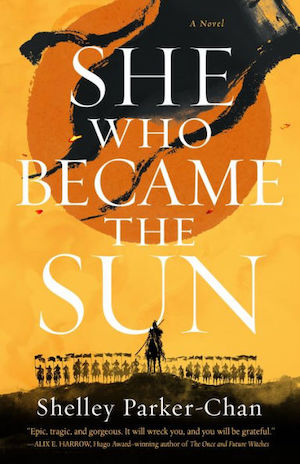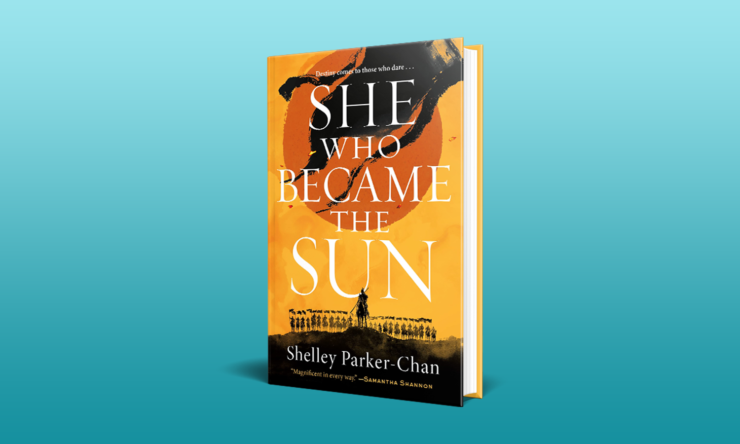As a daughter born in an era of lethal drought and impoverishment, Zhu knows her fate before a fortune-teller confirms it: nothing. In contrast, her brother Zhu Chongba is pronounced to be destined for real greatness—but when bandits murder their father in front of them, Zhu Chongba dies as well. Fueled by a burning desire to survive at all costs, Zhu adopts her brother’s name and grasps for his fate. She becomes a young man, commits to monastic life, and nurtures that hunger to be someone, until a grim encounter with the Yuan’s eunuch general Ouyang sets her on the path toward empire.
Drawing inspiration from the historical Red Turban Rebellion, She Who Became the Sun (first of the Radiant Emperor duology) reimagines of the rise of Zhu Yuanzhang—from peasant to founder of the Ming Dynasty—and the concurrent collapse of the Mongol-led Yuan Dynasty… if Zhu had been the unnamed daughter instead.
Parker-Chan’s gripping, subversive debut produced a nigh-on feral response in me, as if I’d been struck with a blunt but electrified instrument. I can’t overstate how much I appreciated reading an entire book propelled by the intense, grasping, often amoral desires of two queer protagonists whose deeply complicated relationships to gender and their bodies are center-stage. To plunge through a text with such an unapologetically genderqueer perspective felt like leaping into a cold river: percussive, stinging, a real rush. Better still, She Who Became the Sun pulls no punches with its gnawing ethical quandaries about the foundations of empire.
None of the large cast of characters has clean hands, and our protagonists are among the bloodiest of the bunch. As an alternate-historical edged in the fantastic, the novel’s refraction of the “real” founding of the Ming Dynasty allows Parker-Chan to explore thematic issues of politics, ethics, and gender. Awareness of ethnic conflicts historical and contemporary thread throughout the novel, for example, while differing languages and dialects are rendered with textual cues. Dynamic and flexible prose skillfully balances the grand scope of the plot with the intimate details of each character’s life.
Spoilers follow.
Buy the Book


She Who Became the Sun
In terms of ethics, good and bad aren’t on the conceptual table. Ambition—or, the desperate hunger to succeed regardless of cost—throbs instead of heroism at the roots of She Who Became the Sun. Whether that ambition comes in the form of Zhu’s determination to survive and pursue greatness, or Ouyang’s drive to cleave through the center of his life for familial revenge, or Madam Zhang’s trade empire run via the figureheads of sons and husbands, or Baoxiang’s thankless efforts to manage the estate and fund his father and brother’s war-making… core-deep hunger possesses them all.
And I happen to adore books that pluck at the burning hunger to succeed—or, failing that, to matter—that drives people.
Parker-Chan’s unflinching exploration of what that consuming desire ends up costing the characters gives their debut novel philosophical and emotional heft. The brutalities of conquest aren’t presented with a rose-tinted filter, but neither are they painted lurid neon for performative grimness. Plus, amoral ambition from the protagonists is regularly countered by others, such as Ma Xiuying—the woman Zhu marries for equal parts affection and counsel, whose core concern isn’t ambition but empathy and a desire to prevent suffering.
However, questions of ambition do not exist outside of gender—especially considering how Zhu and Ouyang’s visceral conflicts surrounding it propel the overarching plot. Frankly, this is one of the most compellingly trans and queer stories I’ve read in a while; turns out I’ve been craving a book that tackles the “girl dresses as boy then joins [masculine institution]” trope presented from an explicitly trans angle. Overall, the text presents gender as simultaneously a social role, a matter of performance, a lived fleshy experience, a balance of elements, and a construct of sexual desire.
While the initial impetus might be survival oriented, She Who Became the Sun digs deep into the complications and affordances of genderqueer-ness within men’s spaces. Zhu is born a girl then adopts the name and fate of a man; she pursues marriage to a wife as a man in public and in their personal space indulges in her wife’s attraction to her breasts—then fucks that wife as a stone top. Her closest relationship otherwise is to Xu Da, a brotherhood built around shared intense affection; their masculine attachment charmed me to the core. However, Zhu’s alliances—or lack thereof—with other women are a source of discomfort. She intimately understands the cost of being a woman in patriarchy… but she’s standing on the other side of the line.
When Zhu watches the women of defeated lords being divvied up as concubines and servants, she knows her role in their suffering yet still prevents one from murdering her captor. She occupies a liminal space, ignoring her physical form as much as possible and using feminine pronouns in her head but masculine pronouns aloud. She worries fate will slip from her hands if she’s too feminine. Except in the end, claiming her fate—as hers, rather than her dead brother’s—is what unlocks the light of her mandate… but that only happens after Ouyang mutilates her in a duel and she embraces the insight that being “neither one thing nor the other” gives her.
And speaking of, I definitely sent a string of texts to a friend while reading She Who Became the Sun that included gems like, “do not expect me to be normal about General Ouyang it isn’t possible.” His catastrophic relationships with and attractions to other men, his shame and rage over his embodiment and people’s reactions to it, his pained grappling with masculinity and misogynistic rejection of femininity… all those miseries knifed me in the guts. As a queer transmasc reader, I don’t often see parallels for those nastier emotions in fiction—or, if I do, the characters aren’t crafted with the complexity and compassion that Ouyang is.
His status as a eunuch invites disrespect from other men who treat him as an in-between thing, inherently lesser. Affection from Esen, the prince he serves as confidante, comes paired with backhanded cruelty—magnified by the fact that, though lifted to the rank of general, he once belonged to the man as property. Esen constantly gives callous asides about it being nice Ouyang doesn’t need to concern himself with a wife, unable to grasp that he’s rubbing salt in a wound. In one of the worst-best scenes for me, Esen finally reaches toward him with reciprocated desire—but at the last moment says, “You really are as beautiful as a woman,” to which Ouyang’s response is the “stillness of anticipation [flicking] into the stillness of shame.” Humiliation for being as he is, as well as for his buried desire to be handled, lingers poisonous at his core–a contrast to the current shape of Zhu’s arc.
Whether juxtaposed as foils or allies, Ouyang and Zhu are an astounding pair of protagonists. The resonant connection that crackles between them on first sight is full of hunger—spectral, in the form of literal ghosts, but also personal. Zhu, in particular, is struck by the sight of another person whose gender appears to be as liminal as hers. She and Ouyang trade insults and victories over the course of their conflict on opposing sides of the rebellion, until their interests coincide at the correct moment during the conclusion of She Who Became the Sun. Each commits a brutal and calculated assassination; each occupies the resultant vacuum of power. But their paths are bound to cross again—when the second book arrives—and I’ll be eagerly awaiting the outcome.
She Who Became the Sun is available from Tor Books.
Read an excerpt here.
Lee Mandelo is a writer, critic, and editor whose primary fields of interest are speculative fiction and queer literature, especially when the two coincide. They have two books out, Beyond Binary: Genderqueer and Sexually Fluid Speculative Fiction and We Wuz Pushed: On Joanna Russ and Radical Truth-telling, and in the past have edited for publications like Strange Horizons Magazine. Other work has been featured in magazines such as Stone Telling, Clarkesworld, Apex, and Ideomancer.










